Studying Plant Genomics Can Bring Agriculture and Biomedical Engineering Breakthroughs
BU researchers are testing new genetic engineering techniques to better understand how plants adapt to their environments

Ahmad “Mo” Khalil, a BU College of Engineering professor of biomedical engineering, introduced plants to his synthetic biology lab—the first multicellular organisms they’re working with.
These Plants Aren’t for Decoration—They’re for Science
BU researchers are testing new genetic engineering techniques to better understand how plants adapt to their environments
Something unexpected is hiding behind a tightly sealed door on an upper floor of the ultramodern Boston University Rajen Kilachand Center for Integrated Life Sciences & Engineering: an indoor greenhouse. In a building full of bright white hallways, sparkling floors, and sleek glass office doors, the smell of rain and soil that washes over you when the door opens is a delightfully earthy surprise.
Filled with rows of plants in various stages of their life cycle—from seedlings, to blooming, to producing the next generation—the room is a new addition to the lab of Ahmad “Mo” Khalil, a BU College of Engineering professor of biomedical engineering. Despite feeling like a garden, it’s become a place for researchers to study nature’s complexity, as they investigate the fundamental genetic makeup of plants and test new genome editing techniques.
“As a lab interested in how genes are expressed in cells, and developing advanced synthetic tools to control that process, it was clear to me that plants would be a really fun and important new frontier for us,” Khalil says. That’s because plants, with no way to move themselves from one place to another, are very good at adapting to their environments. This has sparked interest in understanding their epigenetics—which is how the outside environment influences what genes are turned on or off during development and throughout life.
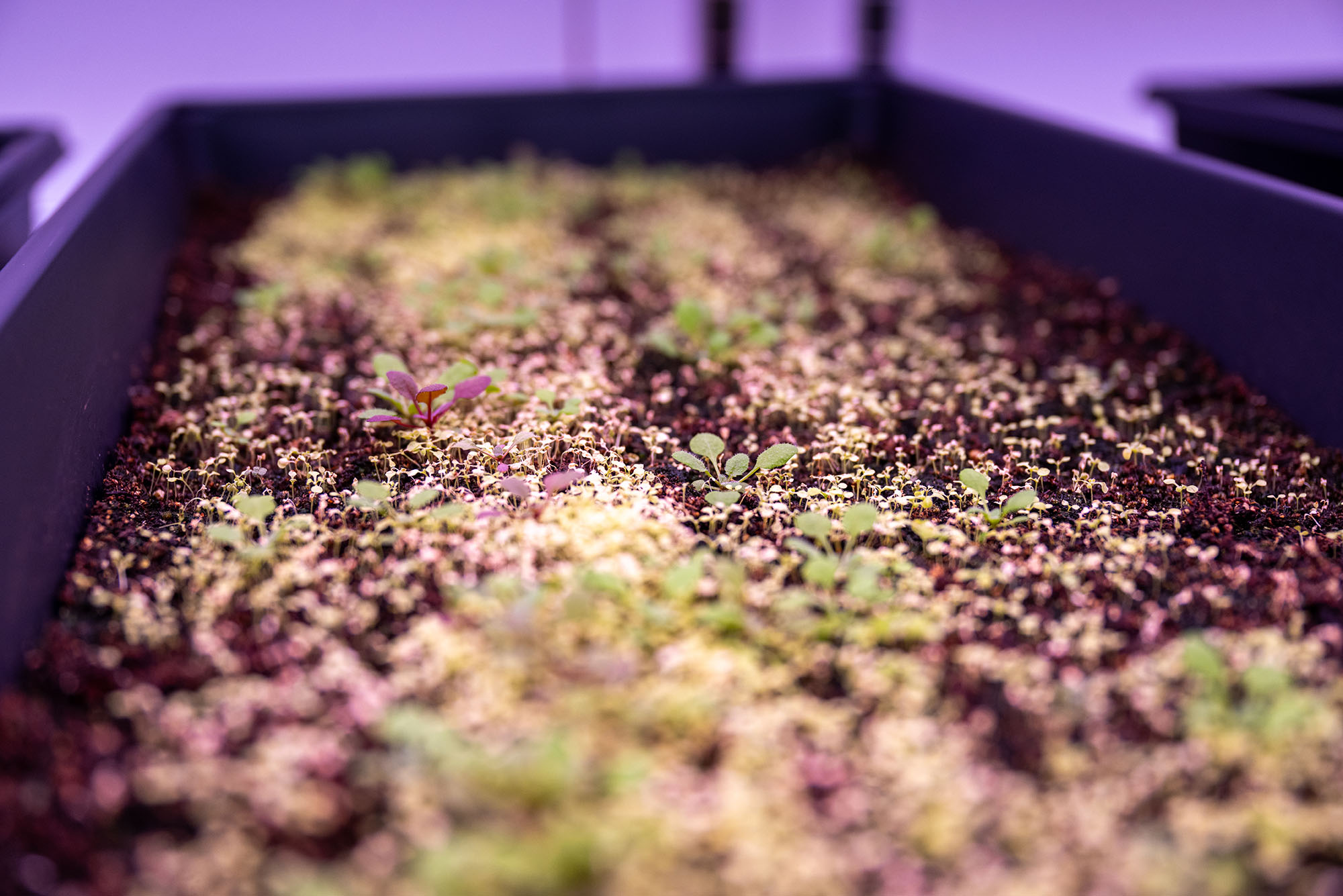
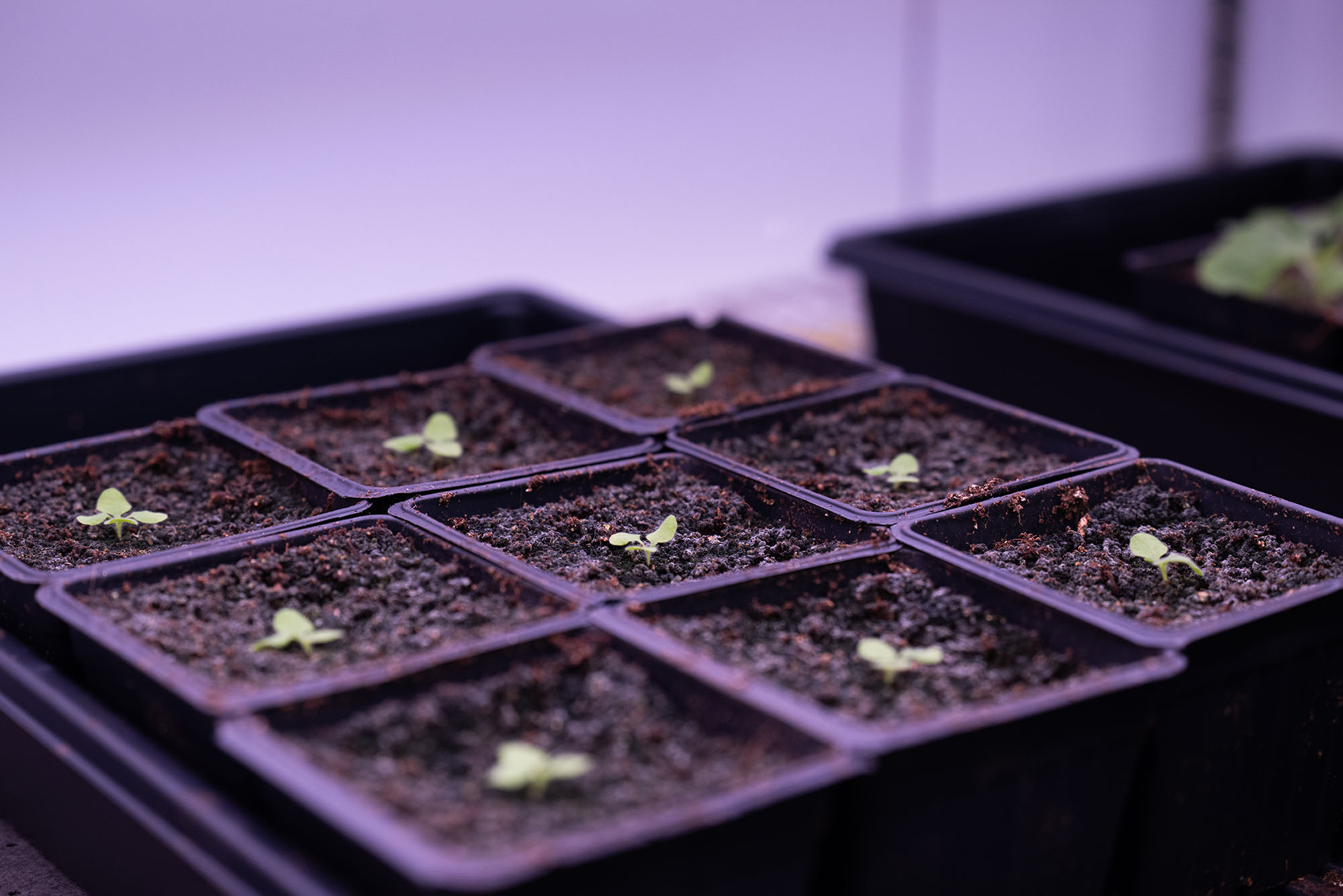
The newest addition to the Khalil Lab has plants in all stages of their life cycle, from seedling to small sprouts, to fully bloomed.
“Plants are masters of gene regulation and epigenetics. Because of their unique life cycle, they have evolved and use many different mechanisms to respond to their environment and remember cues,” Khalil says. “Our aim is to develop and use synthetic biology and genomics tools to dissect these processes and, in turn, manipulate them to ultimately accelerate and advance crop development.”
Khalil is an expert in hacking cells, learning how they work from the inside out to recreate biological processes—like programming immune cells to eliminate cancerous tumors. This is a field known as synthetic biology and Khalil believes it holds boundless potential, from curing diseases to engineering new plants that can withstand climate change. Typically, he and his team use individual cells—like yeast and bacteria—to study and learn how to reengineer them. This is the first time his team has introduced multicellular organisms to their repertoire, and they’ve already started tinkering with new techniques to manipulate plant genomes and program new behaviors.
One species in the new plant lab is Nicotiana benthamiana, a relative of tobacco. The other is Arabidopsis thaliana, commonly called thale cress, which is in the mustard family (and easily spotted outside, sprouting between sidewalk cracks and patches of lawn). It’s noticeable that some Arabidopsis in the lab have white flowers and some red; that difference is the direct result of gene editing being studied by Will Shaw, a postdoctoral fellow leading the project and the main caretaker of the plants.
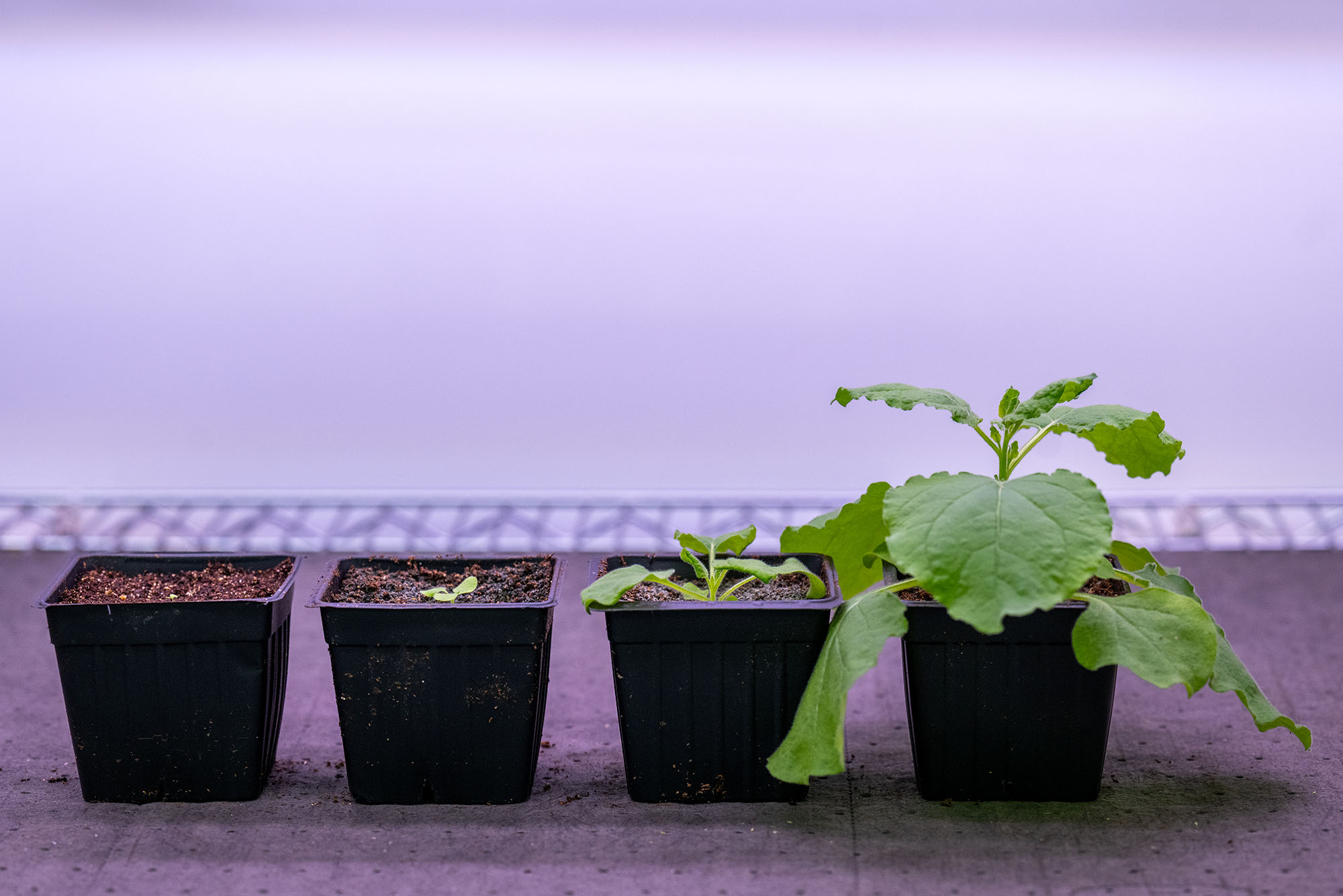

The two current plant species in the lab are Nicotiana benthamiana (left), a relative of tobacco, and Arabidopsis thaliana, commonly called thale cress, which is in the mustard family.
“We are coming up with a totally new approach to study gene regulation in plants,” Shaw says. He is experimenting with what he’s calling a “DNA landing pad.” He swaps out a fragment of the plant’s DNA for a new, synthetic sequence—the landing pad—that makes it easier to later make precise changes to the genome.
“The landing pad contains a few new genes,” Shaw says. One is called RUBY and makes the flowers turn red, giving a visual indication of the plants containing the DNA landing pad. “Once we’ve substituted in the landing pad, it is now primed for putting in new sequences,” such as one that can strengthen a plant’s ability to withstand drought or extreme heat in the future.
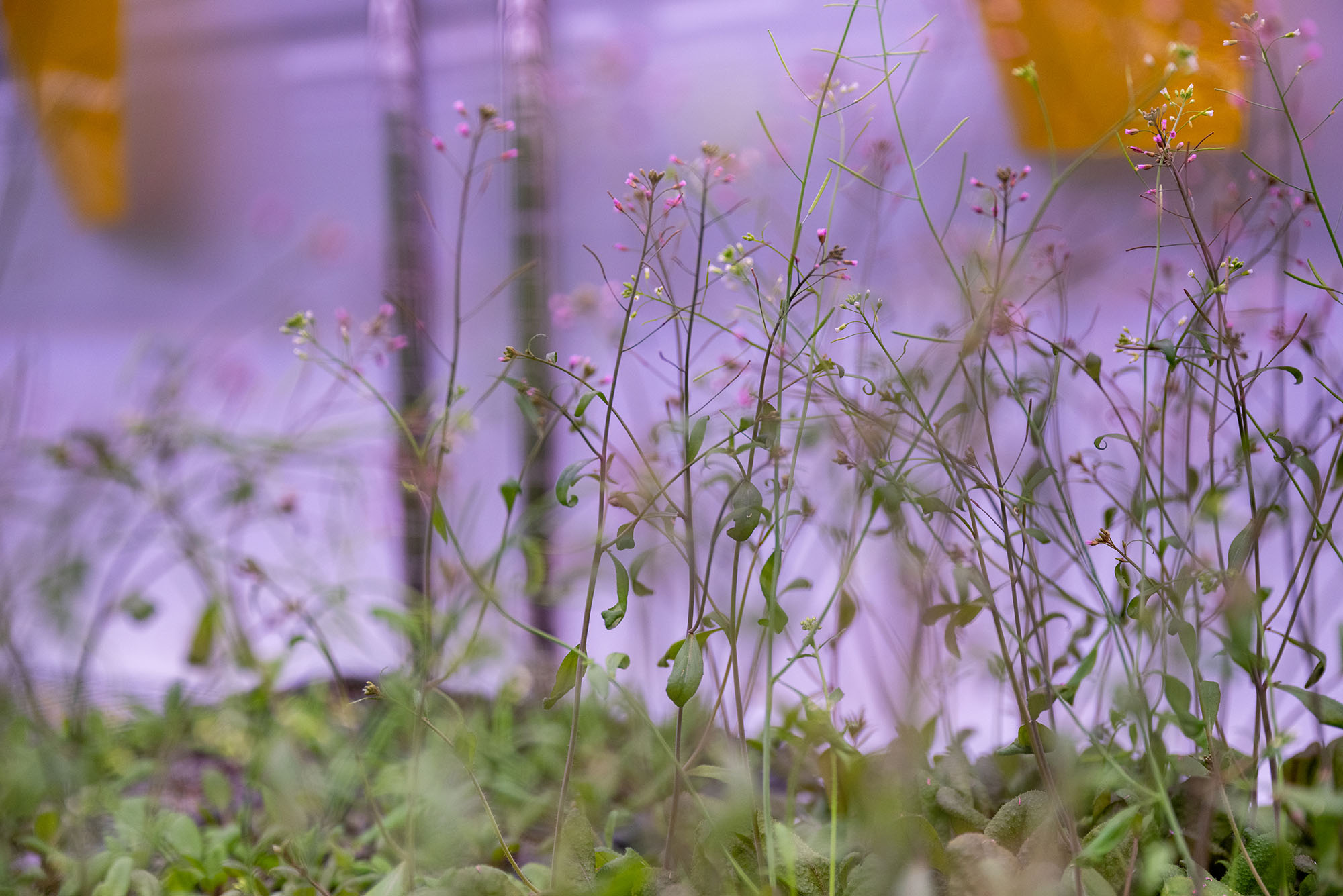
“This is something that’s been very difficult to do historically,” Shaw says.
It may seem surprising, since genetically modified plants—corn, soybeans, and potatoes being some of the most common—can be found in just about every grocery store. But precisely reengineering plants using current technologies is very challenging.
One standard technique, for example, involves sending genes into plants using a bacteria, called Agrobacterium, that drops a new gene—perhaps to make a plant pest resistant—at a random location in the genome. This isn’t ideal, Shaw says, because “this randomness leads to a lot of variability and changes the sequence surrounding the gene, which we know plays an important role in regulation.”
Their new approach using the landing pad is an attempt to get around those challenges, and learn the fundamentals of how plants adapt to their environments.
Even though science is the priority, the plants still need their basic needs tended to: bright light, well-draining soil, the right level of humidity, and regular watering. Shaw took time to learn everything he needed to know about plant biology from Massachusetts Institute of Technology biologist Mary Gehring, who coadvises him along with Khalil. The plant lab is still in its early stages, but Shaw has been joined by two graduate students, Liz Tchantouridze (ENG’28) and Anjali Gajendiran (ENG’28), to expand its scope.
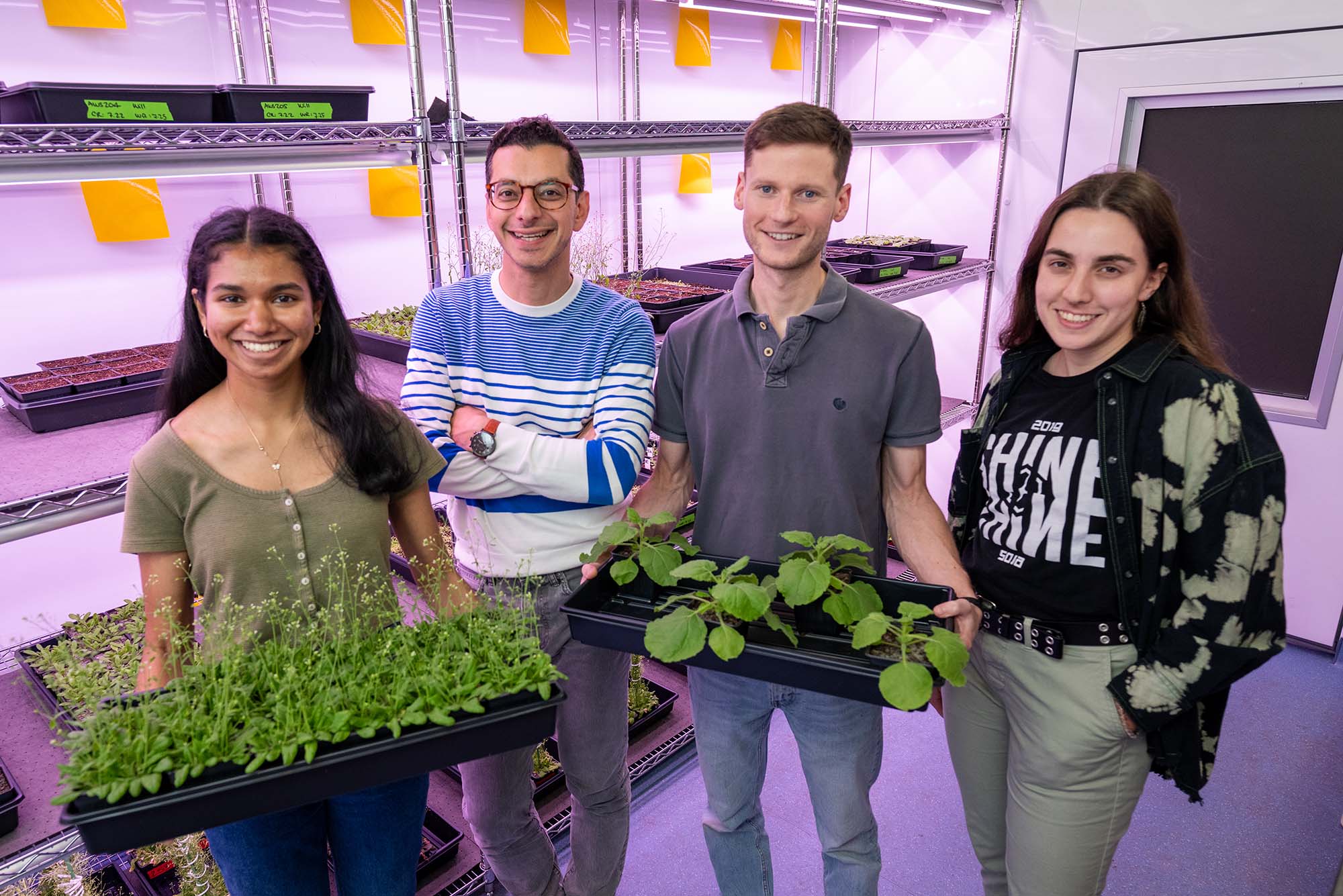
“To address the challenges of climate change, it’s essential to have a deep understanding of how these genetic processes work to the point where we can predictably engineer new behaviors, such as improved adaptation to rising temperatures. This knowledge is crucial for advancing crop development and ensuring food security for a growing global population.” Shaw says.


Comments & Discussion
Boston University moderates comments to facilitate an informed, substantive, civil conversation. Abusive, profane, self-promotional, misleading, incoherent or off-topic comments will be rejected. Moderators are staffed during regular business hours (EST) and can only accept comments written in English. Statistics or facts must include a citation or a link to the citation.